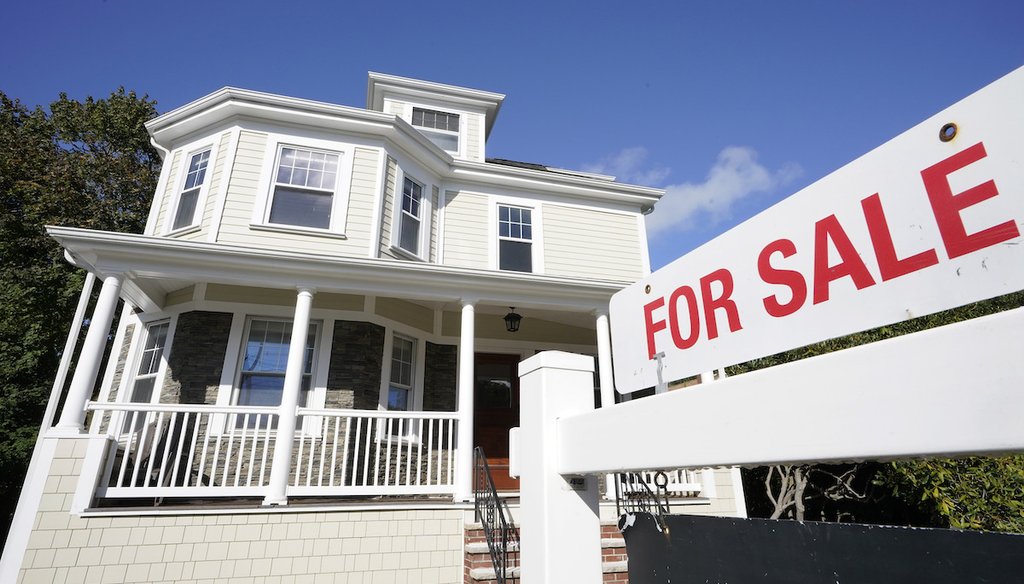Stand up for the facts!
Our only agenda is to publish the truth so you can be an informed participant in democracy.
We need your help.
I would like to contribute

A for sale sign stands outside of a home in Westwood, Massachusetts, Oct. 6, 2020. (AP)
When President Joe Biden announced a plan to forgive student loan debt, he noted its intersection with another issue — Black and Hispanic homeownership.
Biden said on Aug. 24 that many people cannot qualify for a mortgage because of student-loan debt, and the burden of student debt is "especially heavy on Black and Hispanic borrowers."
He added, "They don’t own their homes to borrow against to be able to pay for college. And the pandemic only made things worse."
Conservative talk show host Dan Bongino questioned Biden’s comments about Black Americans during his Aug. 25 podcast, part of which was posted on Facebook the same day.
"Here’s Biden giving his spiel, a bunch of B.S. yesterday about this student loan program, and again invoking Black America, suggesting that if you’re Black it’s harder for you to own a home or you don’t own a home," Bongino said. "What the hell is this guy talking about?"
Bongino also made the case that Biden’s comments about homeownership are part of a larger pattern of racist remarks by the president, a talking point among conservatives.
But Bongino’s skepticism about Black homeownership is not backed by statistics. In the U.S., homeownership for white, non-Hispanic Americans is 73.3%, compared with 42.1% for Black Americans, according to 2020 figures from USAFacts, a nonpartisan government data initiative.
The obstacles to Black homeownership are deeply rooted in American history, and the effects are still felt today.
Black Americans have a higher student loan debt balance than white Americans, which affects their ability to qualify for a mortgage, said Dorothy Brown, a law professor at Georgetown University and author of the book "The Whiteness of Wealth."
On average, Black college graduates owe $25,000 more in student loan debt than white graduates, the Education Data Initiative, an education data and research nonprofit, reported in June.
And even with the new student debt relief plan, the forgiven amounts "may not be enough for you to lower your…income to debt ratio, such that the mortgage lender thinks you are an attractive borrower," Brown said.
Homeownership inequity dates to the end of slavery in the United States, when Black people were broadly prevented from the right of homeownership, said Rosemary Ndubuizu, an assistant professor of African American studies at Georgetown University.
Then, in the 1930s, came the practice known as redlining, which largely barred Black Americans from applying for home loans. The U.S. government "classified different neighborhoods based on how safe it was to give out mortgage loans," according to the Thomson Reuters Foundation.
There were four color classifications: Green was deemed "best"; blue was "still desirable"; yellow meant the neighborhood was "definitely declining"; and red was known as "hazardous."
The districts classified as red largely housed Black people, who were refused home loans because their areas were considered "risky."
Decades later, in 1968, then-President Lyndon B. Johnson signed the Fair Housing Act into law, which aimed to halt discrimination based on race and other factors. Though the act prohibited redlining and other forms of discrimination in the housing market, the effects of the discriminatory policies remain, even today.
For example, Brown said in the early 2000s, Black and Hispanic families were targeted by banks with unfairly expensive mortgage loans. And news coverage has detailed stories about Black American homeowners receiving low appraisals on their home, compared with people of other races.
Forbes reported in 2020 that Black homeowners are nearly five times more likely to own a home in a formerly redlined district than in one that was greenlined.
That has led to disparities in wealth, too.
"The typical homeowner in a neighborhood that was redlined for mortgage lending by the federal government has gained 52% less — or $212,023 less — in personal wealth generated by property value increases than one in a greenlined neighborhood over the last 40 years," according to Forbes.
CLARIFICATION (Sept. 1): This story was revised to more precisely frame the nature of Black home ownership after the end of slavery.
Our Sources
White House, FACT SHEET: President Biden announces student loan relief for borrowers who need it most, Aug. 24, 2022
YouTube, CNN: Biden announces student loan forgiveness plan, Aug. 24, 2022
Facebook, Biden goes full racist AGAIN, Insults Blacks and Hispanics, Aug. 25, 2022
PolitiFact, Dan Bongino
The Heritage Foundation, Biden’s history of getting away with racist remarks, July 7, 2021
ABC 13 News, Biden says Hispanics, Blacks 'don't own' homes while pitching student debt cancelation, Aug. 25, 2022
Education Data Initiative, Student loan debt by race, June 13, 2022
History.com, How the Black Codes Limited African American Progress After the Civil War, Oct. 1, 2020
Thomson Reuters Foundation News, Redlining in America: How a history of housing discrimination endures, July 13, 2020
ThoughtCo., The History of Redlining, June 16, 2020
U.S. Department of Housing and Urban Development, History of Fair Housing, accessed Aug. 30, 2022
The Atlantic, Why Blacks and Hispanics have such expensive mortgages, Feb. 25, 2016
The Washington Post, For Black homeowners, a common conundrum with appraisals, Jan. 21, 2021
The New York Times, Home appraised with a Black owner: $472,000. With a white owner: $750,000, Aug. 18, 2022
USA Facts, Homeownership rates show that Black Americans are currently the least likely group to own homes, July 28, 2020
USA Facts FAQ Page, accessed Aug. 31, 2022
Forbes, Redlining’s legacy of inequality: Low homeownership rates, less equity for Black households, June 11, 2020




















